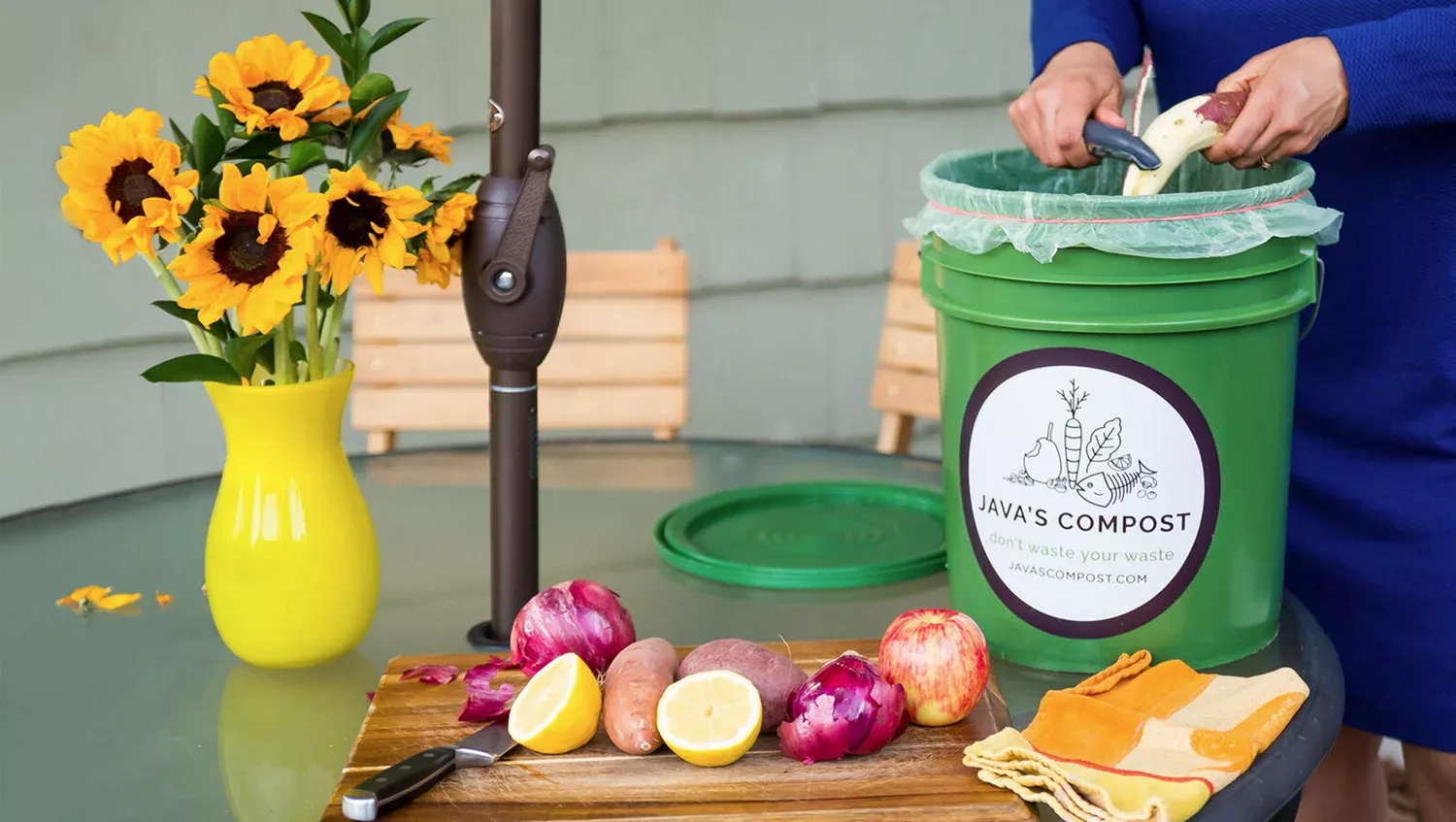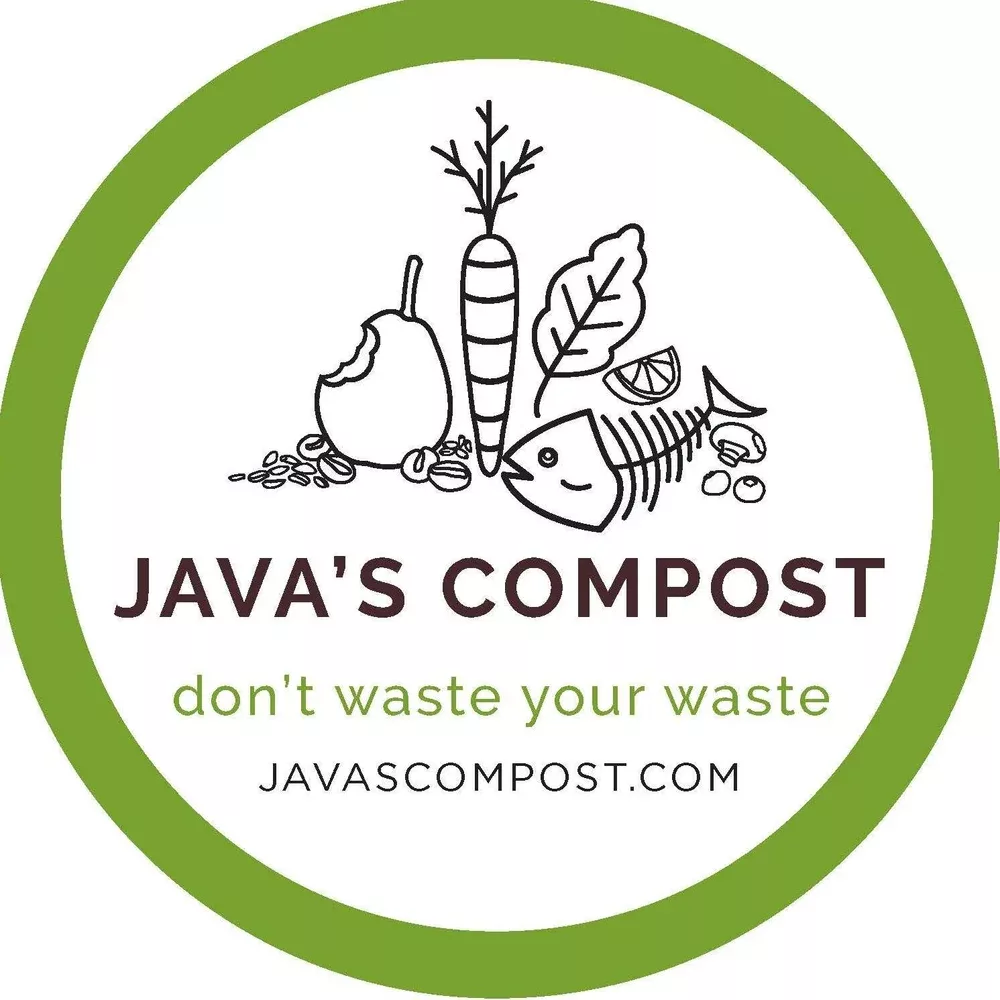


Keep this story going! Share below!
Michelle and Java created Java’s Compost to make at-home composting easy for anyone looking to reduce the impact of their food waste. Their tagline, “Don’t Waste Your Waste,” underscores their belief that compost is an amazing natural resource that should be more accessible. They contribute meaningfully to several UN Sustainable Development Goals, including SDGs 11 and 12 by contributing to a closed-loop production cycle to benefit the local community and reduce consumption, and SDG 13 by preventing waste from reaching landfills, which contribute to methane emissions.
Composting is an effective way to reduce food waste while also improving soil health, but it can be a challenge for many who either lack the space or the knowledge to get started. This is where Java’s Compost comes in, creating convenient access to composting for everyone. Their service allows at-home composting without any of the hassle by providing a system where compostable waste is collected by a team member or dropped off at a local drop-off point. Once collected, the waste will be processed at a facility in Andover, NJ called Ag Choice, which uses the windrow method for large-scale composting.
Their goal is to help people realize the power of compost. 50%-75% of the trash produced can be composted, and with each individual creating roughly 350lbs of waste per year, there is a significant need for these services.
They offer a variety of subscription options to fit each unique situation, with additional tools such as training and guides to help ensure successful composting. If there is ever a question about whether something is compostable, they make it easy to reach out and confirm. Customers of the service also get to choose what happens to their compost: either donate it to the non-profit Urban Agricultural Cooperative to help provide fresh, locally grown produce to the community, or have it returned to them in the Spring at no additional cost.

The idea for the business started with Java, a schoolteacher who managed a rooftop garden as part of the school’s curriculum, where all faculty were required to learn about the garden and integrate it into their classrooms. Java shared that through this experience, he realized just how amazing and special composting really is. He saw how people appreciated the idea of “closing the loop,” in which food waste could return to the earth as something useful rather than ending up in a landfill. Over time, he wanted to do more with composting and eventually provide a composting service to the community.
The motivation behind the innovation, he explained, was to make composting easy and accessible, especially for people living in apartments. At first, they were unsure if it would work, but after starting small in their own apartment and making trips to a community garden, they discovered it was surprisingly very simple, even learning that compost could be frozen to eliminate odors. That early success proved to them that even small actions can make a big difference and that composting doesn’t have to be complicated or messy.
As the co-founders explained, the business grew out of both curiosity and a desire to have an impact on the community. They said, “People appreciate closing the loop,” and added, “We loved seeing the soil we made from compost and giving it back to farmers.” Those experiences showed how rewarding it was to see waste transformed into something that could help others. Their tagline, “Don’t Waste Your Waste,” captures that same purpose, turning what most people throw away into something useful for the environment and society.
Java's Compost’s innovation of a convenient at-home composting service has had a profound impact on its business aspects, society, and the environment.
The innovation of a subscription-based composting service has been the foundation of Java's Compost's success. They have surpassed four million pounds of food waste diverted from landfills since launching in 2018, a milestone that has significantly strengthened their reputation as leaders in sustainable waste management. Their model of providing pickups, drop-offs, and educational guidance has enabled them to build a steadfast customer base that spans approximately 95% of residential clients and local schools. Michelle stated that "Customers love it and see a reduction in trash," highlighting how the clients' satisfaction fueled their steady growth in the industry. Java's Compost tagline, "Don't Waste Your Waste," has beautifully captured the company's appeal: a practical, meaningful service that empowers people to make a difference. In the short term, this innovation has increased visibility and demand, while positioning Java's Compost as a trusted local brand, paving the way for a greener economy in the long term.
Java's Compost's social impact extends beyond waste reduction; it is also tied to education and community empowerment. The company collaborates with both public and private schools, integrating composting into the classroom and educating students about the value of sustainability and the science behind soil health. The services enable individuals to view waste as something more than just garbage, but as a valuable resource. This initiative enables customers who wish to do so to donate their finished compost to the Urban Agricultural Cooperative (UAC), thereby connecting urban agriculture and suburban households and creating a direct link between sustainable waste practices and local food equity. As Java's Compost notes, "By composting, you are not only keeping food out of landfills and incinerators, but you are also helping your neighbors to grow and enjoy nutritious, locally grown food." A model that fosters environmental awareness and social justice, aligning with the United Nations Sustainable Development Goals 11 (Sustainable Cities and Communities) and 12 (Responsible Consumption and Production).
Environmentally, the company's innovation has produced immense benefits. The diversion of millions of pounds of food scraps has contributed to the reduction of methane emissions from landfills, a potent greenhouse gas, and promoted the creation of nutrient-rich soil for local gardens and farms. Their windrow composting process, which involves turning long piles of organic material to aerate them, ensures efficient decomposition with minimal environmental harm. Customers have noticed "less smelly trash, and lower household waste volumes" in the short term. Additionally, in the long term, accumulated compost contributes to healthier soil ecosystems, increased local food production, and reduced dependence on chemical fertilizers. Java's Compost demonstrates how small communal actions can collectively impact the environment by transforming waste into valuable resources that benefit both the people and the planet.
Java's Compost success is tangible, with a diversion of over 4 million pounds of food scraps, an expanding clientele, and ongoing partnerships that strengthen food systems. Their impact is concrete proof that community-based sustainable businesses can scale meaningfully over time. Java and Michelle aim to expand their commercial and municipal contracts while improving infrastructure and partnering with other recycling services to further increase their reach in the future. Although composting is still a "young industry" in New Jersey, Java's Compost continues to set the standard by demonstrating that sustainable living can become the rule rather than the exception with creativity, knowledge, and perseverance.
Java’s Compost, as a business, has reaped many benefits from its innovation. By creating compost from food waste, the company has sold a lot of finished compost to garden centers, farmers, and customers. The profits they earn have been invested back into the company and have therefore expanded their business. Furthermore, from their website, one can access products and purchase them from their online stores. Also, the company has secured contracts with different municipalities, which have helped them collect more food waste and produce more finished compost to sell. The business has also introduced more recycling services and is partnering with local businesses to increase their visibility and attract more customers. The partnership has created credibility and trust in the community, hence building and growing the company.
The business's innovation has brought significant benefits to the environment. The business promotes the SDGs 11, 12, and 13 for cleaner communities, sustainable production, and a healthier environment. Java’s Compost supports this by reducing food waste and promoting locally grown, nutritious food. The innovation has made it possible to reduce food waste in landfills and incinerators, hence reducing the general waste in the community. The innovation has reduced the amount of smelly trash in the household, hence creating a cleaner environment for people to live in. It is estimated that a person can create about 350lbs of compostable waste per year. Therefore, this innovation has reduced this waste from ending up in the landfills by recycling them into compost using them to grow nutritious food. As of August 2025, they have achieved a big milestone of ensuring that 4,484,776lbs of food waste have been kept out of the landfills and incinerators.
Get stories of positive business innovations from around the world delivered right to your inbox.
Michelle and Java Bradley, Co-Founders
